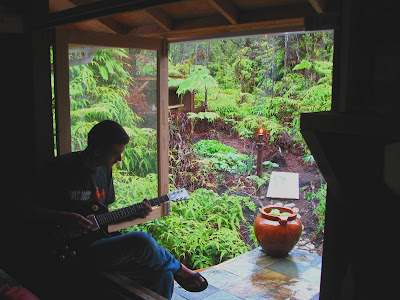Just as combative handgun experts suggest--there's no crime in the first shot being wild, as long as the 3rd pull is dead on the money. Sometimes it takes focus to focus.
Obviously a lot of you are thinking about the same sorts of stuff, which is why my in-box is flooded.
I think we can draw a bead on the target. Let's think things through together.
"Green" is an unaccountable, immeasurable, bullshit term prone to distortion and exploitation.
"Sustainability" is an unaccountable, immeasurable, bullshit term prone to distortion and exploitation.
"Ecological" is an unaccountable, immeasurable, bullshit term prone to distortion and exploitation.
What do I mean? I mean terms like these have come to be expressed in gassy, almost religious overtones where the definition of each is so vaguely defined it's immune to the probings of reasonable critique and rational discourse. They cannot be held to any standard of accountability. If I say I live a "green" lifestyle, what the hell does that mean? So does John Travolta. There's obviously massive problems with the integrity of the term green if it can encompass lifestyles as diverse as his and mine. Hell, I don't even have a proper landing strip for the chickens.
This sloppy thinking and fast slick wordsmanship MUST change, as the "ecological movement" is being rapidly commercialized into horseshit consumerism!Since the issue we face ultimately is a
performance oriented issue--not an
ideological one--meaning the world economy, global climate change, and resource depletion is one of measurable empirical issues, so should be our response to the issue. It has relationship to what you "feel," only with what you "do"--or more importantly--
what you don't! Meaning, precisely, that in the same way that population, balance sheets, energy input and output are measured, so should be our relative success. I don't think this is a difficult or high bar at all. It is, again, a shot at that word "effectual" that I brought up at the first. Who is greener? Who is wiser? Who is more humane? Easy--who lives better on less?
The success and credibility at this moment of one's ecological integrity should not be measured by one's bankroll, or the high powered consulting wage one draws, nor the size of one's eco-estate, but rather by the LACK of all the above.Who is the ultimate judge of who is an effectual person or not? Not I, but I will suggest, among those of us who know sailing understand the ultimate judge of sailing performance is certainly Poseidon Himself, and with living, it must be Life. Not to wax metaphysical, but surely we can agree it is admirable to find examples of those who do much, and more so those who do much with little, and more so those who do more with nothing. Likewise, vs. versa.
So, let us demand much much more, both of ourselves and others. Quantify, in real terms, your assertions or back away from your argument! For example, if you say photovoltaic cells are more "green" than gasoline, I'll grant you that, because I don't really care. I want to know whether they're more effectual--which is a quantity drivable, meaning will I get more power, less co2, and usage out of 5000 bucks worth of gasoline or PV panels? This is not a unrealistic question to ask, and one of many,
and it must be asked. WE ARE PLAYING FOR HIGHER STAKES AT EVERY MOMENT.
And the stakes are already VERY high. This isn't your papa's "back to the land" movement. The 60's hippies went "back to the land" to frolic in the flowers.
My generation is doing it to cover their ass, not expose it.Who's right? Not me, I'm no expert. I'm just some dude living in the jungle on pennies. We'll know in 20 years, won't we. . .?
So, back to designing the woodburner stove. . .this diatribe brought you by some young dreadhead buck who informed me he "taught sustainability" for a living.
Chew on that. Chew on it again.

















